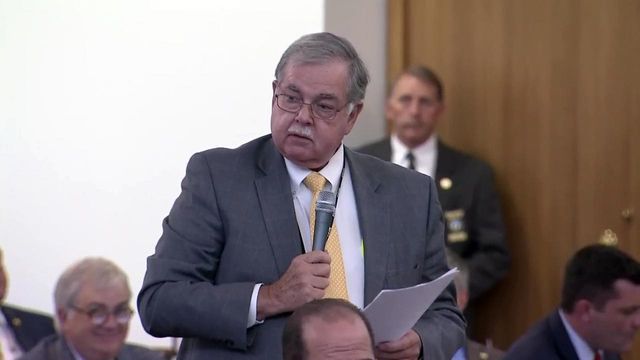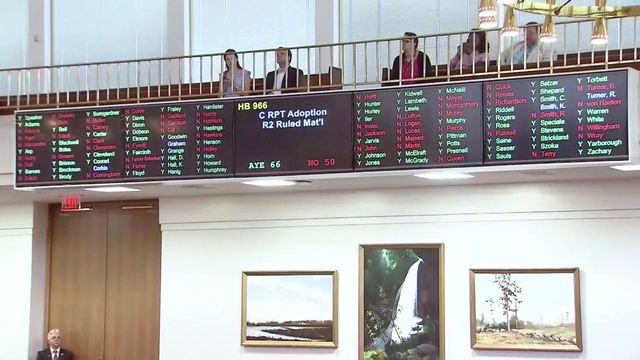House, Senate give preliminary approval to budget deal
The House and the Senate both gave preliminary approval Wednesday to a $24 billion compromise state budget for the fiscal year that starts next week.
Posted — UpdatedFour Democrats, Sens. Floyd McKissick, D-Durham, Toby Fitch, D-Wilson, Ben Clark, D-Hoke, and Don Davis, D-Pitt joined Senate Republicans in a 34-14 vote in favor of the budget. Similarly, three House Democrats, Reps. Elmer Floyd, D-Cumberland, Cecil Brockman, D-Guilford, and Howard Hunter III, D-Hertford, joined the Republican majority for a 66-50 vote in that chamber.
"Compromise 101 is you don't get your way totally," Senate President Pro Tem Phil Berger said Wednesday. "You move some from your position toward the position of the other folks."
Lawmakers have included language in the budget package for a special legislative session later this year to discuss access to health care, including Medicaid expansion. Berger, R-Rockingham, cited that as their effort at compromise on the issue.
But Senate Minority Leader Dan Blue said Republican budget-writers have completely ignored Cooper's spending priorities, making the budget debate "pointless."
"You're not hearing what's clearly been said," said Blue, D-Wake. "Democrats have been pretty clear about our priorities."
The budget that House and Senate Republicans rolled out Tuesday includes teacher salary increases in the neighborhood of 2 percent a year over the next two years that are heavily weighted toward teachers with at least 15 years experience.
Past state budgets focused on younger teachers, and legislative leaders have said it's time to focus on veteran teacher salaries.
Teachers with 15 years on the job or less would get only their normal step increases on the salary schedule. Teachers with more would get additional raises between 1 and 3 percent in the budget's first year. Teachers with 25 years of experience or more would get $500 bonuses in each year of the two-year spending plan.
Most state employees would get 2.5 percent salary increases each year, budget writers said, with $15 million more earmarked to supplement salaries in hard-to-fill prison jobs.
State retirees would get 0.5 percent bonuses to their pensions, instead of a true cost-of-living increase, in both budget years.
The proposal also has tax cuts the House and Senate have previously backed in other bills this session, raising the standard deduction for personal income taxpayers, increasing collections on internet sales taxes and rolling back the state's franchise tax on businesses.
The budget also includes language requiring the state Department of Health and Human Services to move from Raleigh to Granville County and calls for $4.4 billion in state spending on K-12 school construction, usually a local obligation, over the next decade using an existing state infrastructure fund.
During a two-plus-hour debate, a dozen Democrats decried the budget as short-sighted and cheap, insisting North Carolina should be investing more in education and health care and not on business tax cuts.
"If ever there was a year when the good should outweigh the bad [in a budget], this is that year," House Minority Leader Darren Jackson said.
Jackson, D-Wake, called cuts to the Department of Health and Human Services budget "cruel, calculated and cynical."
Rep. Julie von Haefen, D-Wake, said the budget underfunds education, and Rep. Wesley Harris, D-Mecklenburg, criticized the pay-as-you-go plan for school construction. Bypassing a major bond referendum on next year's ballot for this payment system is like buying patio furniture from Kmart on layaway, he said.
"I choose to represent the values of this state and not the landed gentry," said Rep. Evelyn Terry, D-Forsyth.
But House Speaker Tim Moore said opposing the budget merely to support Cooper's stand on Medicaid was misguided.
"A veto accomplishes nothing. All it does is stop something," said Moore, R-Cleveland, noting that no new budget means that the budget GOP lawmakers passed over Cooper's veto last year will remain in effect.
"We're addressing the core needs of the state," he said.
Related Topics
• Credits
Copyright 2024 by Capitol Broadcasting Company. All rights reserved. This material may not be published, broadcast, rewritten or redistributed.






